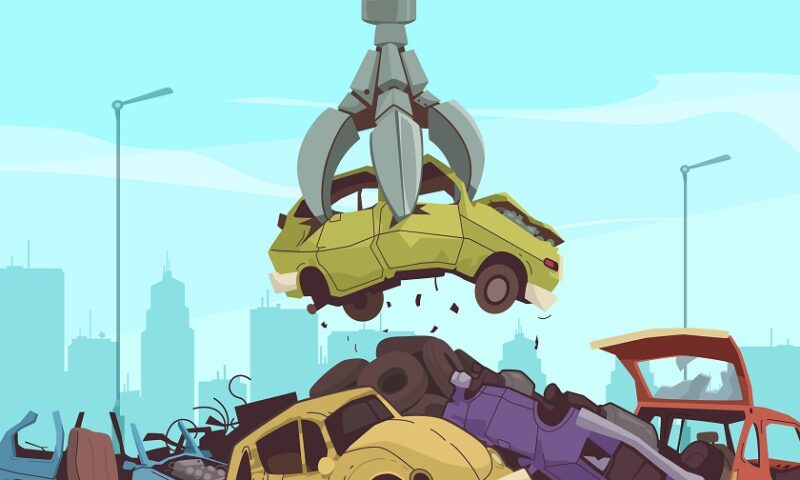Your car has been with you through thick and thin, faithfully transporting you from place to place. However, as time passes, every vehicle reaches a point where it’s no longer worth keeping on the road.
Knowing when it’s time to junk your car can be a challenging decision, but it’s a choice that could save you money, reduce stress, and even benefit the environment.
In this comprehensive guide, we will discuss the signs, considerations, and next steps for determining when it’s time to say goodbye to your trusty old vehicle.
Signs It’s Time to Junk Your Car
Frequent and Costly Repairs
One of the most obvious signs that it’s time to consider junking your car is when the cost of repairs becomes prohibitively expensive.
If you find yourself sinking more money into repairs than the car is worth, it’s time to reevaluate your options. Continually patching up an aging vehicle can quickly become a financial burden.
Advanced Age and High Mileage
Age and mileage play a significant role in the decision to junk a car. Most cars have a finite lifespan, and as they accumulate mileage and years, they become more prone to mechanical issues.
A general rule of thumb is that a car with over 150,000 miles or one that is more than 10-15 years old may be nearing the end of its useful life.
Safety Concerns
If your car has persistent safety issues that can’t be easily resolved, it’s time to think about junking it. Safety should always be a top priority when it comes to your vehicle. If your car lacks features like airbags, anti-lock brakes, or has severe structural damage, it may no longer be safe to drive.
Declining Fuel Efficiency
As cars age, their fuel efficiency tends to decrease. If you notice a significant drop in your car’s gas mileage, it can be a sign that the engine or other crucial components are wearing out. Driving an inefficient car can cost you more in fuel expenses over time.
Emission Failures
Increasingly stringent emission standards mean that older cars may struggle to pass inspections.
If your car consistently fails emissions tests, it can lead to expensive repairs to bring it into compliance. In such cases, it may make more sense to junk the car and invest in a newer, more environmentally friendly vehicle.
Unavailability of Replacement Parts
For older or less common car models, finding replacement parts can be a significant challenge.
If essential components are no longer available, repairing your car can become virtually impossible, forcing you to consider other options.
Considerations Before Junking Your Car
Before making the decision to junk your car, consider the following factors:
Market Value vs. Sentimental Value
Evaluate the market value of your car. You can use resources like Kelley Blue Book or consult with local dealerships to get an estimate.
Compare this value to any sentimental attachment you may have to the vehicle. While it can be challenging to let go of a car with sentimental value, it’s essential to make a practical decision.
Alternative Transportation Options
Consider your transportation needs and alternatives.
If you live in an area with robust public transportation or have access to car-sharing services, you may find it easier to let go of your car. On the other hand, if you rely heavily on your vehicle, you’ll need to plan for a suitable replacement.
Environmental Impact
Think about the environmental impact of your decision. Older cars tend to emit more pollutants and contribute to air pollution. Replacing an older car with a more fuel-efficient or electric vehicle can significantly reduce your carbon footprint.
Repair vs. Replacement Costs
Compare the cost of repairing your current vehicle to the cost of purchasing a newer or used one. Sometimes, investing in a more reliable and efficient car can save you money in the long run.
Next Steps for Junking Your Car
Once you’ve decided it’s time to junk your car, here are the steps to follow:
- Gather the Necessary Documents: Before selling or junking your car, ensure you have all the required documents, including the title, registration, and any maintenance or repair records.
- Remove Personal Belongings: Clean out your car and remove any personal items. Check the glove compartment, trunk, and under the seats to make sure nothing is left behind.
- Cancel Insurance and Registration: Contact your insurance company to cancel your coverage, and notify your local DMV or equivalent agency to unregister the vehicle.
- Find a Reputable Junkyard or Salvage Yard: Look for a local junkyard or salvage yard that accepts junk cars. Be sure to choose one that is reputable, licensed, and offers fair prices.
- Get Multiple Quotes: Don’t settle for the first offer you receive. Contact multiple junkyards to get quotes for your car. This will help you ensure you’re getting a fair price.
- Arrange Transportation: If the car is no longer drivable, you’ll need to arrange for transportation to the junkyard. Some junkyards offer towing services, while others may require you to make these arrangements yourself.
- Complete the Sale: Once you’ve accepted an offer, complete the sale by signing over the title and any necessary paperwork to the junkyard. Ensure you keep copies of all documents for your records.
- Remove License Plates: Before the car is taken away, remove your license plates. Depending on your location, you may need to return them to your DMV.
- Notify the DMV: Notify your local DMV or equivalent agency that you’ve sold or junked the vehicle. This will protect you from any future liability associated with the car.
Saying Goodbye To Your Car
Deciding when it’s time to junk your car can be a difficult but necessary decision. While it can be tough to say goodbye to a vehicle that has served you well, the signs of an aging or problematic car are often too significant to ignore.
By considering factors such as market value, safety, and environmental impact, you can make an informed choice about whether it’s time to part ways with your old car.
Following the appropriate steps for disposal will ensure a smooth transition and help you get the most out of your vehicle’s remaining value, whether through sale or recycling.
Ultimately, knowing when to junk your car can lead to a safer, more economical, and environmentally responsible choice for your transportation needs.









